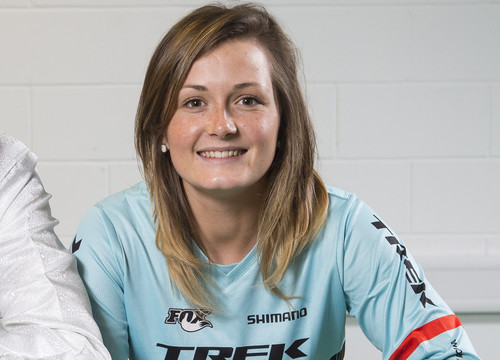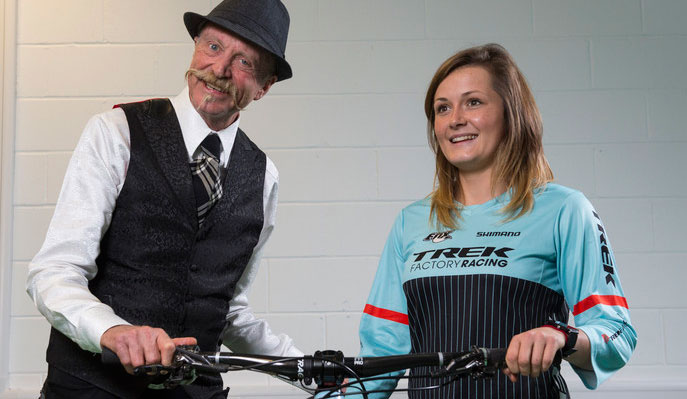
You’ve done consultancy work with Geraint over the past few years. How did you first meet him and find out about the consultancy work we offer?
I actually live in the same area as Geraint and he’s also into riding bikes, so we met through a common friend. I was getting coached already, so it was a case of being in the right place at the right time that I met Geraint when I was looking for something different.
What do you work on with Geraint and what’s been the most useful thing that he has helped you with?
We do really helpful testing where we work on the stationary bike measuring my fitness levels in different training zones. That’s great because when you get the numbers you can see where you’re at and track your progress. I'm really learning from him what those numbers mean, and understanding what will impact my training and performance.
I’ve not studied sports science or done a qualification - normally I just train and I know my body and how to work hard. But there’s a balance within that: you’ve got to understand how you’re reacting to different things and that actually, maybe, you need more rest. You’re getting information and knowledge about what you’re really doing. That’s really valuable, because it helps you make the right decisions when you’re training.
What’s the most surprising thing you’ve learnt from the consultancy about your training or performance that you might not have known without the kind of expertise a sports scientist can offer?
How important rest is.
Oh really?
Yep, massively. I’m a complete doer, so I want to do everything and I want to just graft, graft, graft, and it actually got me into a lot of trouble because I went through a phase where I would just completely over-train.
Geraint was a key component - well, really just the key - to getting me out of that phase and opening my eyes by saying to me, 'actually you just need to rest. Without rest you’re not going to make any adaptions, so all this grafting that you’re trying to do isn’t going to make any difference. You need to rest to allow your body to do that.'
Another thing I really learnt from Geraint was that emotional and mental stresses affect your body in exactly the same way as physical stress. If your life stresses are up and you’re continuing to train at a massively high level, that's detrimental, and actually you just need to take a step back until things sort themselves out. It was about understanding why I needed that balance in my training to help me make the right decisions.
And do you think it’s easier to take that advice on board when you can see the numbers that back it up and it’s coming from an expert?
Yes, definitely. I look at what I’ve done when I’ve been in that over-training state and compare those numbers to where I maybe haven’t been training so much, but I’ve been focused on the quality of the training instead, and I can see the difference in the numbers. But it’s also having someone with that expertise. In the end, the numbers are just a confirmation of what Geraint already knows - I believe him because I know that he knows his stuff. After a while I almost don’t need the numbers to know that what he’s saying is right, you know, they end up being just another thing for him to look at me and go 'look, I am right' (laughing).
(Laughing) so you’ve built up a lot of trust with him?
Yes, totally, totally.
What would you say is the most challenging part of the consultancy process? I can imagine it can’t be easy having to adapt your training. It sounds like it was difficult for you to learn to rest to begin with and that was a big change for you.
Well it wasn’t too bad because I’d already gotten to the point of totally overtraining, so in the end resting was a really good thing for me. Mentally, I was just absolutely ruined. I didn’t want to touch a bike, I didn’t want to do anything, because my body was like 'what are you doing?' It was in total survival mode. It got to the point that I was even pushing the boundaries of not touching sport again. So coming back from that and having to rest ended up being a good thing.
I don’t think there’s really a hard part of it because, for me, the training is something I’ve always done. Really I think it’s just about using these people, who are experts, to your advantage, so you get the best out of yourself. Sometimes it’s not necessarily doing what you want to do - but it’s important to have someone with expertise you can trust saying 'that’s ok, you need to rest and this is going to work out better in the long run'.
So it’s the reassurance from someone who’s an expert and knows what they’re talking about that’s just as valuable to you as the training plan they create.
Yes. It’s really important that you can trust what they’re saying, because if you doubt anything about what you’re doing things can go wrong. That’s partly how I landed where I was when I was overtraining; I doubted the person that I’d been working with before, and that doubt spirals into a whole load of stress when you’re not seeing the results that you want to. Having someone like Geraint, who you totally trust and you know that they know what they’re talking about is much easier and less stressful. You can speak freely and say 'oh, something’s happened, what should I do?', and they’re just like, 'that’s ok, just do this instead, that’s fine'. It’s a relief to have that support. All I need to do is follow what they tell me and it will work.
What would you say to another athlete who may be considering getting one-to-one consultancy but isn’t sure about it, isn’t sure about how much it would help?
I’d say that if this is something that they want to improve on and do well at, or if they have a specific goal to work towards, it just works. There’s no doubt about it, in terms of having someone to work with and someone that knows how to train you for whatever event it is you’re trying to work for.
This is my job, this is what I do, and training is just part of it. I wouldn’t do it without a coach. But if you’re someone who’s just saying 'I’m going to do this event, I’ll see about getting some help', to see how it really, really helps, it reaffirms how important expert guidance is. It just means that you know that the effort that you’re doing is being put into the right area.

What was it like meeting Gary Fisher at Sighthill Campus? Had you ever met him before?
I roughly met him one time before and had gotten a picture with him but that was as far as it went; he was on his way out the door. It was really cool to meet him properly. I got to have a bit of chat with him and just the way he talks, you feel like he just knows so much.
What did you ask him?
I can’t even remember, I was just kind of in awe of everything he was saying, bike-rider to bike-rider.
I’m quite young so I’ve been riding for a relatively short period of time, but he was there creating mountain biking in the States, he was one of the people behind all of that, and when you speak to him and you hear the way he’s talking you just get that feeling of 'wow! You’ve seen so much’. Even in the small time that I’ve been in the industry I’ve seen how much it’s changed; the bikes have changed, the whole sport’s changed in my short time. But he’s seen it from the start, so he’s seen its whole evolution. It’s really, really interesting, so it was really cool to get to meet him.
And finally, what’s the trickiest situation you’ve ever been in with your bike?
[Long pause] That’s a good question. I did travel for five months in a van in Europe and I didn’t have a shower or a toilet in the van at all - it was definitely character building! We had done a month training, then we’d gone out to the USA and Canada, just following the races, and we would come back to the van every night. I just remember one time we were in a car park and there’s a pipe that was coming from the river and it was going back into this bit of a stream, and I remember going like 'right, ok I’m ready' and running out of the van and getting under the freezing cold water. I washed myself, rinsed off and then ran back to the van as quickly as possible! It’s that lifestyle of trying to make it work, trying to make a career out of it, that you just have to start somewhere if you want to be successful in your sport, just grafting every day until you make it.
So now if you were going on tour would Trek pay for a van with a shower for you?
Well, the way the races work out I don’t go around in the van anymore, because there are so many random places. But yes, now Trek would book me into accommodation with a bed and a shower, and a roof, and I could stand up and…
And now you know you’ve made it?
Yes! (laughing).